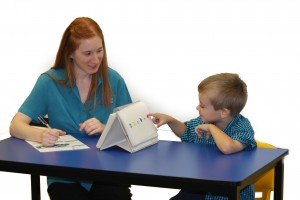
It’s that time of the year when school reports have been sent and parent teacher interviews have been held. Parents, teachers and kids are thinking about the rest of the school year. If your child is not doing as well as you would like they may have a language based learning problem.
Language skills effect many aspects of schooling from reading, writing and spelling to concentration, behaviour and social skills. Difficulties with language vary from child to child and so do the effects on schooling.
Kids with difficulties with language skills may have difficulties with:
- reading
- understanding and remembering what they read
- putting ideas down on paper
- sounding out words when writing
- sounding out and blending sounds when reading
- writing sentences that make sense, with correct grammar and word order
- spelling
- attention, concentration and memory
- learning and remembering new information and concepts
- listening and following instructions
- completing tasks
- getting along and working with others
- making and keeping friends
Teachers may make comments such as:
- has difficulty staying on task
- difficulty listening and following instructions
- needs support to finish activities
- has difficulty retaining information and concepts
- is not at age level for reading, writing or spelling
- has difficulty understanding or remembering what is read
- is easily distracted
Children with language based learning difficulties benefit from support targeted at their specific needs. As each child is different a language assessment can help determine each child’s specific strengths and weaknesses and pinpoint the most effective support and strategies.
Language assessments usually include assessment of:
- receptive language including the child’s ability to listen, follow instructions, understand words, sentences and concepts
- expressive language including using vocabulary, forming sentences and stories
- for school aged children written language including writing sentences and stories
- phonological awareness including sounding out and blending sounds in words, understanding syllables and rhyme
- where indicated use of speech sounds
The assessment then allows the speech pathologist to determine the child’s strengths and weaknesses and to compare their skills to other children of the same age and year level. The speech pathologist can then suggest strategies which may help the child in the classroom as well as suggest activities for therapy and/or home practice to build the child’s skills in areas of greatest need.
An assessment now can provide vital information to the school to help provide your child the right support for the rest of the school year as well as allow some time to help your child develop their skills before the next year begins.
The following example shows how an assessment and therapy can help:
Amy was near the end of year one. She seemed quite bright but was not progressing in reading or writing. She was becoming more unhappy about going to school and was avoiding written work as much as possible. She was refusing to do her reader or sight words at home which was further affecting her progress. She had a language assessment which showed good expressive and receptive language skills but very poor phonological awareness skills. Amy could not hear rhyme or syllables or break words into separate sounds, so literacy was a huge struggle for her. She attended half hour therapy sessions with a speech pathologist each fortnight and did paper based and computer based activities at home, targeted specifically to her skill level. Because the activities were at the right level for Amy she became more confident and more willing to practice. She was soon enjoying her practice activities, wanting to write and showing progress with her reading. Within three terms she had literacy skill levels at her age level, was more cooperative with school and home work and was enjoying school.
To help parents and teachers support children to develop literacy skills Talking Matters has developed a “Starting School Pack” which can be downloaded for free from the front page of our website. There is also a large amount of information about language and literacy on the “downloads” section of our website which can be downloaded for free.
Parents if you are concerned about your child’s progress at school a speech pathologist can provide you with the help you need to develop your child’s skills.
Teachers if you have concerns about children in your class let parents know that a speech pathology assessment would help.
For more information about language assessments at Talking Matters browse our website.
Don’t wait to provide help to a child who is struggling at school. Early intervention can prevent or reduce longer term problems with learning and self esteem.
Related posts:
Top 10 ideas for literacy
Procedures for school
Developing story writing
At school, now what?
Related Blog Posts
If you liked this post you may also like:
Ready to Write
Understanding Sentences
Emergent literacy
Case Study Thon Alou



